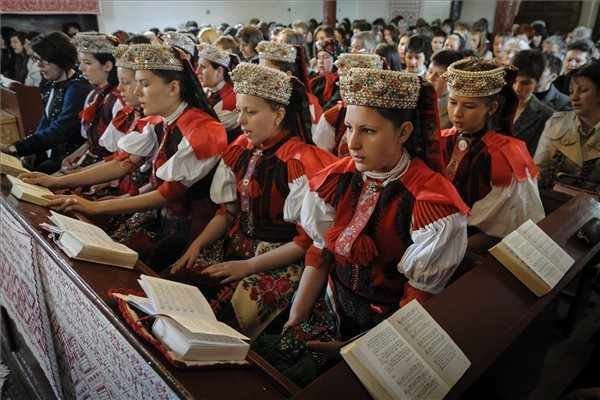Is there a future for the Hungarians living in Romania?

An interesting article appeared on 24.hu about the Hungarians living in Romania, but outside Transylvania. During the difficult years of Communism, many Hungarian intellectuals had to leave Transylvania to work in other parts of Romania, far from their families and the Hungarian communities hoping that they will assimilate easier. Today, Hungarians move to Bucharest to get higher salaries, but their assimilation did not stop.
In 2020 it was the 100th anniversary of the Peace Treaty of Trianon when the Great Powers gave 2/3rd of Hungary’s former territories and 1/3rd of the Hungarians to neighbouring Romania, Serbia and Czechoslovakia. These states tried and try even today to make these people leave their ancestor’s land or assimilate them with more or less success. Therefore, Romania “offered” jobs for Hungarian intellectuals outside Transylvania for decades to separate them from the Hungarian communities. That is why, for example,
the Democratic Alliance of Hungarians in Romania could get more than 20 thousand votes outside Transylvania in 2016, 3,108 of them in Bucharest, the capital of Romania.
Richárd Buday, leader of the Petőfi Community Centre in Bucharest said that Hungarians should not come to the Romanian capital, because it is a melting pot of different ethnicities. He is the offspring of a Hungarian family that has been living in Bucharest for five generations and one of the leaders of the local Hungarian community.
The Hungarian community living in Bucharest is very colourful from the doctors to the housekeepers, and most of them came to get higher salaries after 1989. However, since it is
much easier to assimilate than to preserve the national identity
there are many Hungarians who no longer speak their mother tongue even though they did so ten years ago. Mr Buday said that he could be happy if the Hungarian community there grows. It happens that Hungarian parents talk to their children in Romanian in Bucharest and they do not send them into the only Hungarian school in the capital. Mr Buday added that the situation of the Hungarian communities in Romania
worsened in the last 100 years and even Fidesz and PM Viktor Orbán could not help that.
Furthermore, Bucharest has been thinking about Transylvania as one of its colonies since Trianon.
Interestingly, the Democratic Alliance of Hungarians in Romania received a lot of votes in the 2019 European Parliament elections for which the National Anticorruption Directorate started to investigate, but they did not find anything.
Béla Farkas, a geographist living in Râmnicu Vâlcea, moved from Transylvania after the university and says that approximately 300 Hungarians live in his county. He says that some of the Hungarians went back to Transylvania after the fall of Communism. Those who remained tried to hide that they were Hungarians some time ago or are too old to preserve the Hungarian community. Only 30-50 people take part in the Hungarian masses in the local Calvinist church. He added that there was no tension between the different nationalities of the city.
Mr Farkas says that some Hungarians show their original identity only in the voting booth and support the Democratic Alliance of Hungarians in Romania.
András Király, a former secretary for education in Romania, said that Hungarian schools are rare outside Transylvania, there is one in Bucharest and a few in Moldavia where the Csangos live. They are a Hungarian ethnographic group of Roman Catholic faith living mostly in the Romanian region of Moldavia, especially in Bacău County. Their traditional language, Csango, an old Hungarian dialect, is currently used by only a minority of the Csango population group. However, the Roman Catholic diocese of Iași forbids to hold religion classes in Hungarian at schools so children can hear Hungarian only during the Hungarian language classes. These are not compulsory but optional in the region thanks to the unsupportive attitude of the Romanian education system.
Source: 24.hu

